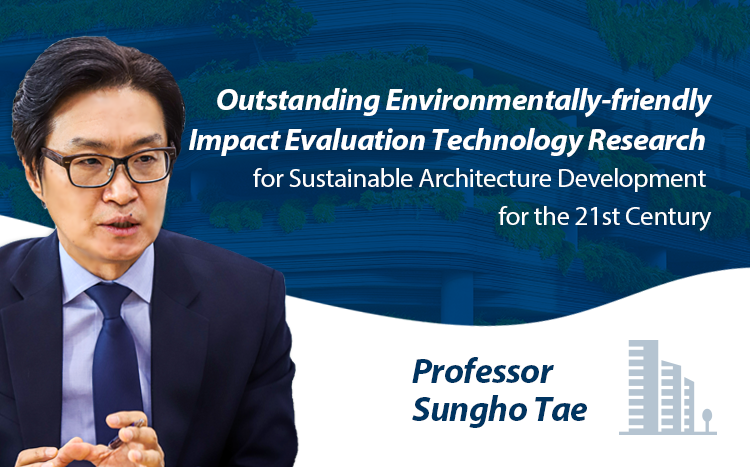Notice

Professor Sungho Tae, the head of the Hanyang University Sustainable Building Research Center, is developing a commercializing program that deduces various environmental impacts on the global environment throughout the life cycle of building materials and buildings. Whole-step environmental evaluation programs such as the Sustainable Total Evaluation Program for Building (STEP-B) that Professor Tae’s lab has developed and the Sustainable Total Evaluation Program for Concrete (STEP-C) are in use as tools for eco-friendliness evaluation, and his lab is the only group that conducts such research in Korea. Professor Tae studied at Tokyo University as he was interested in high strength concrete, which is the main material for skyscrapers. Japan’s world-class environmentally friendly architectural material research’s provisions and values inspired him to study in this field. His environmentally friendly building performance evaluation and high-end technology research lab (suBest) is developing a “goal-oriented environmentally friendly optimal planning system” through a building’s environment load decreasing model and evaluation technology development. One of the most important aspects of eco-friendly building research is the evaluation of eco-friendliness in quantitative ways. STEP-B, which was developed by his research lab, evaluates the level of environmental friendliness of building processes such as greenhouse gas emissions, and STEP-C measures the environmental friendliness of concrete materials. There have been few scholars and papers studying such methodologies, and suBest is the only domestic research lab that has developed them as an industrial tool. The STEP-B program in particular is now being used to evaluate the environmental friendliness of architectural structures in G-SEED (a certificate system of Korea that is given to eco-friendly buildings).
Professor Tae focuses on sustainable architecture which has evolved from green architecture. He was first introduced to Completely Recyclable Concrete at the materials research lab at Tokyo University. It allows concrete that is disused after the demolition of a building to be recycled and utilized as a new building material after decomposition. Recycling becomes possible, even for environmentally unfriendly aggregates, when they are coated during the construction phases. He was shocked to know that concrete can be considered an eco-friendly material as it is completely recyclable. After this epiphany, Professor Tae is now focusing on research that studies sustainable architecture and brings new ideas to Korean architecture. In the past, eco-friendly architecture was called various terms such as ecological building, green building, and environmentally symbiotic building. At the time, there was a tendency to think of eco-friendly architecture as simply coexisting with nature. If the past trend was to decrease energy use and the emission of greenhouse gases while using materials that are assimilated to nature, current sustainable architecture is a concept that harmonizes environmental, social, and economic factors of architecture. His focus is on forming a quantitative evaluation method to reach the target performance when making eco-friendly buildings and building materials. Also, it focuses on developing various eco-friendly building technologies that can evaluate and adjust environmental, social, and economic impact on the global environment in relation to the complete life-cycle including the production, use, and disuse of a building or of building materials, going beyond the past goal of lower energy-consuming technology development, through high-efficiency heating and cooling facilities and the application of high insulation/high density construction materials.
Professor Tae has published more than sixty SCI-level papers. He received the Hanyang University Best Faculty Award (June 2019) as the excellence of his research was recognized, and his outcomes are evaluated so favorably that the has received the Best Dissertation Award from KOFST (June 2018) and the Minister’s award from the Ministry of Land, Infrastructure, and Transport (December 2014). Leading the technology commercialization, he registered an intellectual patent and his eco-friendly building and building material evaluation program was commercialized, and he is now putting much effort into transferring and providing technologies. Data gathering and analysis can be considered his core technologies as his research analyzes a vast amount of data and creates databases and evaluation methods. Therefore, he has requested active cooperation from scholars and researchers in the same field to contribute to society and to implement such technologies as national standards. In his lab there are not only Chinese students but also Swedish students who hail from the world’s most environment-focused country. His desire to become a true professional is evidenced by his studying throughout the course of his whole life, and he hopes his students become mature people who exercise professionalism in the service of humanity. Professor Tae was also honored with the Best Faculty Award as he received good reviews of his lectures from his students, and since he served as vice-chair of the Hanyang University Volunteer Corps and the chair of the Center for Students with Disabilities.